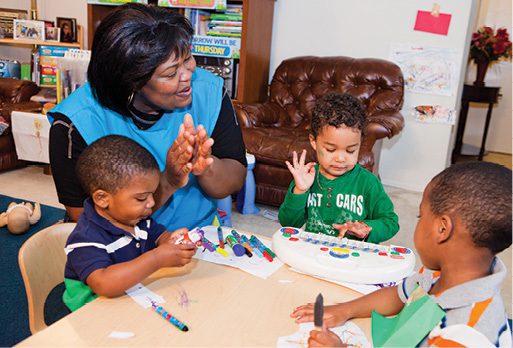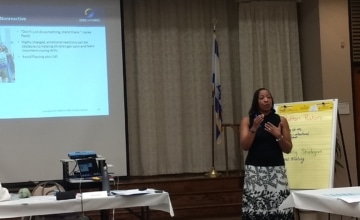Sarah LeMoine, ZERO TO THREE, Washington, DC, Mary Harrill, National Association for the Education of Young Children, Washington, DC, and Shyrelle Eubanks, National Education Association, Washington, DC

Abstract
Quality early childhood education requires excellent educators. Yet, the United States’ complex and inconsistent early childhood “system” hinders this excellence. In 2017, thousands of diverse educators, advocates, and allies partnered with national organizations to form the Power to the Profession Initiative with the goal to establish professional unity and clarity. Over the course of 3 years, this initiative developed a comprehensive roadmap with and for the profession: the Unifying Framework for the Early Childhood Education Profession. In 2021, the Commission on Professional Excellence in Early Childhood Education was launched to oversee the implementation of this framework and to serve as a unified voice for the profession. Implementation progress will take time and perseverance to advance the needed systemic changes. But we’ve built a pathway and sustainable progress is happening across the country with each small and big step we take together.
Quality early childhood education (ECE) requires excellent educators. An excellent educator is intentional because she is present and understands who she is, how she is, and what she does. She is open to learning from those she supports. She builds respectful and responsive relationships that welcome children and families to share who they are, how she is or can be with them, and what she can do to advance their goals. The United States’ current early childhood “system,” though, essentially is built to hinder excellence. The ECE workforce has varied titles, roles, expectations, and requirements within and across states, sectors, and settings. The various sectors within ECE often have different governance homes within states resulting in differing qualifications and expectations for individuals (and early learning programs) depending on the setting and the age groups being served. Inconsistencies also exist in the availability and quality of preparation programs, perpetuating systemic inequalities and barriers to access and complete comprehensive training and higher education programs. At the heart of much of the complexity and challenges in the system is the lack of equitable compensation for early childhood educators.
Framing a Common Vision
In 2017, in partnership with thousands of diverse educators, advocates, and allies, 15 national organizations (see Box 1) formed the Power to the Profession Initiative (powertotheprofession.org). This initiative’s goal? To establish unity and clarity around the career pathways, knowledge and competencies, qualifications, standards, accountability, supports, and compensation to define the ECE profession across all states and settings. Its results? The Unifying Framework for the Early Childhood Education Profession (2020a).
Unifying Framework’s Primary Recommendations
The Unifying Framework (2020a) defines the ECE profession within the broader ECE field, and its professional body of knowledge and skills as its central system component. The Framework lays out a pathway to create one birth through age 8 ECE workforce that is fairly and equitably compensated. Its primary recommendations include:
- Creating a structure in which the cacophony of labels and roles is reduced to three distinct and meaningful designations (Early Childhood Educator I, II, and III) and all early childhood educators hold a license to practice.
- Establishing a primary set of career pathways, aligned to the designations of the profession.
- Increasing state and federal investments in ECE to achieve fair compensation for the profession.
- Creating a broader, more coherent system, as other professions have done—a supportive infrastructure with shared responsibility.
Box 1. The Power to the Profession Initiative
The following groups joined together to form the Power to the Profession National Task Force:
- American Federation of State, County and Municipal Employees
- American Federation of Teachers
- Associate Degree Early Childhood Teacher Educators
- Child Care Aware of America
- Council for Professional Recognition
- Division for Early Childhood of the Council for Exceptional Children
- Early Care and Education Consortium
- National Association for Family Child Care
- National Association for the Education of Young Children
- National Association of Early Childhood Teacher Educators
- National Association of Elementary School Principals
- National Education Association
- National Head Start Association
- Service Employees International Union
- ZERO TO THREE
In addition, the Unifying Framework makes a series of implementation commitments to the field that honors the existing workforce as we work toward creating a future ECE profession that is well-prepared, diverse, effective, and well compensated. These commitments include:
- We will not advocate for increased educational requirements without advocating for funding to provide requisite supports and attendant compensation.
- We will not advocate for new regulations or requirements for early childhood educators without advocating for increased funding and capacity supports so that programs, institutions, and educators across all settings can implement them.
- We will not advocate for new regulations or requirements for early childhood educators without advocating to establish and implement realistic timelines that recognize the challenges faced by the existing workforce, across all settings.
- We will not advocate for new regulations or requirements for early childhood educators without advocating for implementation plans and timelines that recognize the particular challenges that family child care and other community-based providers face, so as not to contribute to or worsen their widespread decline.
- We will not advocate for policies that disproportionately and negatively impact educators from communities of color.
- We will not advocate for policies that advance the early childhood education profession without doing the work to mitigate unintended consequences and create meaningful pathways for advancement. (2020a, p. 5)
Big and Small Implementation Steps
“Implementation of the Unifying Framework will ultimately build a bridge from the present to the future.” (2020a, p. 5).
“[It] embraces our future workforce and honors our existing one by recognizing and respecting their diversity, dedication, and experience.” (2020b, p. 1)
Fully realizing the vision of the Unifying Framework is not going to happen within the next year or even 5 years, but implementation progress is well underway across many states. There are big and small steps that states, higher education institutions and systems, early learning programs, foundations, advocates, professional organizations, the federal government, and others can take toward the Unifying Framework. See Table 1 for some of the ways in which states are approaching this work.
Table 1. Implementing the Unifying Framework
Note: ECE = early childhood education
ECE Profession in the Driver’s Seat
Implementing the Unifying Framework requires work at the program/institution- and state/systems-levels to align to the recommendations. It requires right-sizing roles, ensuring the ECE profession is in the driver’s seat, not the state or federal government. As the profession takes on more responsibility, the federal and state roles will evolve to focus on regulating practice and targeting investments to ensure quality, safety, and accountability.
As such, the Unifying Framework calls for the establishment of a permanent governing body, comprised of the stakeholders in the ECE profession, to oversee the implementation of the Unifying Framework and serve as a unified voice for the profession. In 2021, the Commission on Professional Excellence in Early Childhood Education (ECE Commission) launched to serve in this role.

The Framework lays out a pathway to create one birth through age 8 ECE workforce that is fairly and equitably compensated. Photo: ZERO TO THREE
The Commission is composed of 16 organizational members and 11 educator members (see Box 2). All members are co-equal, full voting members who together authentically represent the ECE profession. Organizational members must, and do, represent a nonprofit organization or institution which addresses a core component of the ECE professional ecosystem, including but not limited to: accreditation, specializations, licensure, professional preparation, certification, credentialing, and housing professional competencies.
The ECE Commission’s primary duties are to:
- hold the standards, competencies, and guidelines of the profession;
- set the parameters for quality assurance of individuals and professional preparation programs; and
- coordinate with state and federal bodies to promote alignment with the profession’s recommendations.
Currently, the ECE Commission is finishing its development of model legislation and regulations specific to professional licensure for Early Childhood Educators I, II, and III. The intent of this work is to support states in creating professional licensure structures specific to ECE and adopting the Professional Standards and Competencies (National Association for the Education of Young Children, 2019). The models are designed to be used as guides that each state can adapt as helpful for their specific context and include parameters for waivers and exemptions.
Box 2. Commission on Professional Excellence in Early Childhood Education (ECE Commission)
Organizational Members
- Associate Degree Early Childhood Teacher Educators
- American Federation of Teachers
- Child Care Aware of America
- Child Care Services Association (CCSA), T.E.A.C.H. Early Childhood National Center
- Council for Professional Recognition
- Division for Early Childhood of the Council for Exceptional Children
- Early Care and Education Consortium
- McCormick Center for Early Childhood Leadership
- National Association for the Education of Young Children
- National Association for Family Child Care
- National Association of Early Childhood Teacher Educators
- National Black Child Development Institute
- National Education Association
- National Indian Child Care Association
- National Workforce Registry Alliance
- ZERO TO THREE
Educator Members
- Doris Dupuy, Operations Director, Resonance Network (DC)
- Quentin Brown, Executive Director, Educare Lincoln (NE)
- Cera Alber, Program Director, Green Trees Early Learning Center (PA)
- Bridget Barden, Teacher, Shunk Child Care (ME)
- Shucrea Victor-Cameron, Teacher, Broward County Public Schools (FL)
- Dominque Foster, Friendship Public Charter School (DC)
- Tessie Ragan, Owner/PreKindergarten Teacher, Perfect Start Learning (CA)
- Tamara Johnson, Executive Director, Malaika Early Learning Center (WI)
- LaTonya Sibley, First Class Foundation Administrator, Alabama Department of Early Childhood Education
- Pamela Truelove-Walker, Senior Director, Early Learning and Early Education, Alabama Department of Early Childhood Education
- Shelly Potter, Teacher, San Juan Unified School District (CA)
Additionally, the ECE Commission has begun its focused work on professional licensure assessments. These efforts include developing principles for guiding Commission deliberations related to ECE professional licensure assessments, grounding the Commission’s understanding of how other professions approach licensure assessment, and determining the decision-making sequence regarding how existing assessments would be recognized and/or whether new assessments should be developed.
What’s on the horizon for the ECE Commission? Designations, approvals, and advocating. The ECE Commission anticipates designating: additional guidelines for the ECE profession such as standards for advanced practice (Early Childhood Educator IV) and for program directors/administrators, and designating accreditors of ECE professional preparation programs. Approving specializations and advocating for birth-8 licensure systems are also on the agenda for the Commission. Supporting systems change is a long game, but the Commission is cognizant of ensuring the foundations are solid and represent the future the ECE profession wants and deserves. The Commission is committed to seeing the recommendations of the Unifying Framework come into fruition and understands the gravity of the task with which it is charged.
Advancing the ECE profession is a social imperative, and it is social justice work. When the current systems cause harm to educators, it can also harm children and their families. Investing specifically in early childhood educators is the best thing that can be done to improve ECE. Educators are uniquely positioned to determine their profession, its practices, and its related policies. The profession is in their hands, they build it because it is them. What better hands could there be for these efforts?
…by establishing clarity about who early childhood educators are and what they will be accountable for… [we have a] fighting chance at getting the significant and sustained public investments that our children and families need…. They are investments in our nation’s essential infrastructure, as important as other public goods such as highways and clean drinking water. They are investments in people, who are the most valuable resource our country has, and who represent the cornerstone of quality in early childhood education. With the voices of educators at the forefront of the movement, we must take advantage of this moment, for the good of our country’s children, families, educators, businesses, and economy.” (2020b, p. 2)
Learn More
Coming soon … The Commission on Professional Excellence in Early Childhood Education’s (ECE Commission) website is almost ready! Until its launch later in 2023, check out powertotheprofession.org for related resources, including tools to help you engage with friends and colleagues, share your story, and keep in touch—implementing the recommendations of the Unifying Framework will take all of us.
ZERO TO THREE is a proud member of the ECE Commission and honored to represent infant–toddler educators in this work. Make sure your voice contributes! Stay engaged as a ZERO TO THREE member www.zerotothree.org/membership
Authors
Sarah LeMoine, MS, is senior director, Professional Innovations Division (PID) at ZERO TO THREE. PID is dedicated to developing pioneering products and services for and with the multidisciplinary early childhood workforce. Ms. LeMoine’s role focuses on content and innovation strategy, including professional development (PD) programs, the LEARN Signature Events, ZERO TO THREE’s Membership Program and the ZERO TO THREE Journal, and related products and services. Ms. LeMoine has centered her career on early childhood PD systems and workforce issues. She has more than 30 years of extensive experience ranging from direct service work to national-level research and writing, technical assistance and training, policy analysis, and advocacy. Previously, she directed the Administration for Children and Families’ National Center on Child Care Professional Development Systems and Workforce Initiatives (PDW Center) Center at ZERO TO THREE and the National Association for the Education of Young Children’s (NAEYC) State Workforce Systems Policy, and she held leadership and technical assistance positions with the National Child Care Information Center (NCCIC) and the Wheelock College Center for Career Development. She has authored and co-developed numerous professional development systems and practice publications and tools, including the discussion paper Beyond Reflection: Advancing Reflective Supervision/Consultation to the Next Level; the ZERO TO THREE Critical Competencies for Infant-Toddler Educators™; Office of Child Care/Office of Head Start’s PD system cost analysis tool, and the Strengthening the Workforce toolkit focused on workplace conditions, compensation, and access to PD; chapters in Teachers College Press edited volumes on workforce and PD competencies and system policies and governance; NAEYC/NACCRRA’s Training and TA Glossary; NAEYC’s policy blueprint for State PD systems; NCCIC’s simplified PD systems model; and the first national technical assistance paper on cross-sector PD systems. Ms. LeMoine is honored to serve on numerous national and international advisory boards and workgroups to advance early childhood professional systems and practice, including as ZERO TO THREE’s representative on the Commission on Professional Excellence in Early Childhood Education (ECE Commission) and chair of the ECE Commission’s Nominations Committee.
Mary Harrill, MTS, is senior director of higher education at the National Association for the Education of Young Children (NAEYC). In this role, she oversees NAEYC’s higher education accreditation system for early childhood degree programs, and leads NAEYC’s engagement with the early childhood higher education community. Ms. Harrill also staffs the Commission on Professional Excellence in Early Childhood Education (ECE Commission). Prior to working at NAEYC, Ms. Harrill worked at Achieving the Dream (ATD) as an associate director overseeing grants to improve student success in community colleges and managing the recruitment and retention of colleges in the ATD network. From 2001 until 2014, she worked for the American Association of Colleges for Teacher Education (AACTE) in many roles–including overseeing federal and state policy, managing state chapters, overseeing governance operations, and leading initiatives to improve principal preparation and advance clinical preparation of educators. She holds a bachelor of arts in sociology from Stetson University and a master of theological studies from Candler School of Theology at Emory University.
Shyrelle Eubanks, EdD, is the senior policy analyst at the National Education Association (NEA), where she is responsible for the development of policy, programmatic, and advocacy initiatives related to early childhood education, social–emotional learning, and racial and social justice. She also represents the NEA on the Commission on Professional Excellence in Early Childhood Education (ECE Commission) and currently serves as ECE Commission’s chair. Prior to her work at NEA, Dr. Eubanks was an associate professor in the Early Childhood Department of Prince George’s Community College, Largo, Maryland. She is also a former training development coordinator for the Massachusetts Office of Child Care Services (OCCS) where she worked with OCCS staff to provide diversity training as well as child care resource and referral agencies to ensure quality training and educational opportunities for family child-care providers in African American and Hispanic communities. Dr. Eubanks is also a former pre-kindergarten and kindergarten teacher. Dr. Eubanks received a doctor of education degree in education policy from the University of Maryland, a master of arts degree in child development from Tufts University, Medford, Massachusetts, and a bachelor of arts degree in early childhood and lower elementary education from Xavier University of New Orleans.
Suggested Citation
LeMoine, S., Harrill, M., & Eubanks, S. (2023). PERSPECTIVES: Work in progress—Intentional pursuit of early childhood education excellence. ZERO TO THREE Journal, 43(3), 55–60.
References
American Federation of State, County and Municipal Employees; American Federation of Teachers; Associate Degree Early Childhood Teacher Educators; Child Care Aware of America; Council for Professional Recognition; Division for Early Childhood of the Council for Exceptional Children; Early Care and Education Consortium; National Association for Family Child Care; National Association for the Education of Young Children; National Association of Early Childhood Teacher Educators; National Association of Elementary School Principals; National Education Association; National Head Start Association; Service Employees International Union; & ZERO TO THREE. (2020a). Unifying framework for the early childhood education profession. http://powertotheprofession.org/unifying-framework
American Federation of State, County and Municipal Employees; American Federation of Teachers; Associate Degree Early Childhood Teacher Educators; Child Care Aware of America; Council for Professional Recognition; Division for Early Childhood of the Council for Exceptional Children; Early Care and Education Consortium; National Association for Family Child Care; National Association for the Education of Young Children; National Association of Early Childhood Teacher Educators; National Association of Elementary School Principals; National Education Association; National Head Start Association; Service Employees International Union; & ZERO TO THREE. (2020b). Unifying framework for the early childhood education profession: Executive summary. http://powertotheprofession.org/wp-content/uploads/2020/03/Power-to-Profession-Framework-exec-summary-03082020.pdf
National Association for the Education of Young Children. (2019). Professional standards and competencies for early childhood educators. www.naeyc.org/sites/default/files/globally-shared/downloads/PDFs/resources/position-statements/standards_and_competencies_ps.pdf




